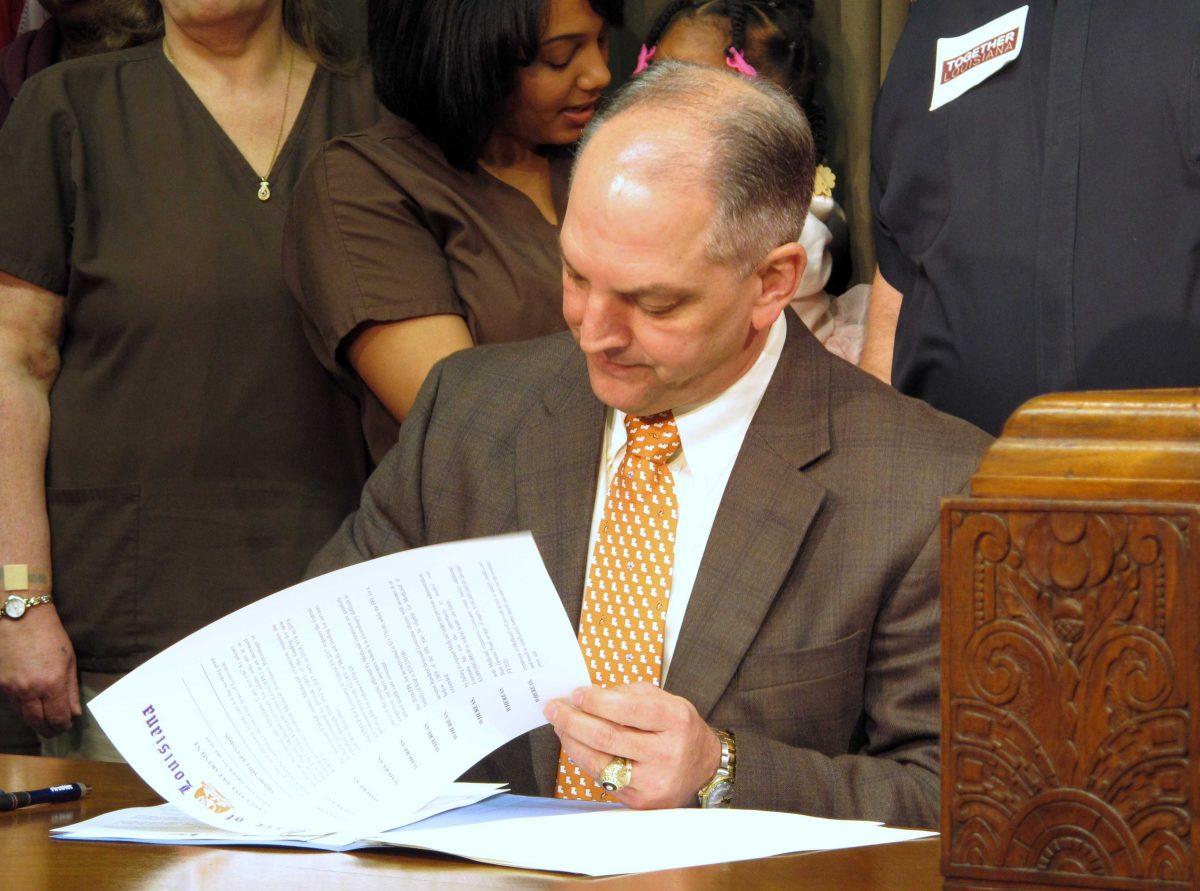In a scene reminiscent of a Shakespearean tragedy, Louisiana higher education’s funding was left bleeding on the ground of the State Capitol. As politicians dug their knives into its body, higher education turned to its students in a last ditch effort to stop the bleeding.
During former Gov. Bobby Jindal’s second term, the state legislature cut higher education by nearly $700 million. Louisiana State University, went from a 58 percent state funded overall budget in 2008 to 33 percent of the school’s budget funded by the state in 2015, according to the LSU Office of Finance and Administration.
Last spring, higher education institutions faced the highest possible cuts since Jindal took office. Under the governor’s executive budget proposal, 82 percent of the already dwindling state funds to higher education risked cuts.
With such a dire threat, Louisiana’s tragic character grew tired of the predictable ending to its budgetary drama.
On April 30, 2015, hundreds of LSU students and supporters marched to the Capitol’s steps, shouting “no funds, no future” and “make the change, march the Capitol.” According to State House of Representatives Democratic Caucus Director Chris Frink, legislators deep within committee rooms in the Capitol’s basement heard the chants, despite the hundreds of pounds of concrete separating the two groups.
Weeks later, the State House of Representatives voted to raise $615 million in new tax revenue aimed to cut the state’s $1.08 billion tax credit and exemption program. The final approved budget raised nearly $700 million in new tax revenue and $400 million through stunting government growth by not filling open positions, filling the remaining gap through what state economist Greg Albrecht calls “ad hoc resources,” or one-time funding measures.
State legislators heeded the cries of higher education when LSU president F. King Alexander and students around the state put a face to the budget cuts.
The fixes are short term though.
According to the Public Affairs Research Council of Louisiana, most of the budgetary plugs will expire within two to three years. For example, $103 million in funds created by ending the business utility tax exemption phase out this upcoming fiscal year.
In August, six weeks into the state budget cycle, the legislature cut $4.6 million in higher education’s budget and other state services. November came and the Revenue Estimating Conference determined the drop in oil prices would tally up the mid-year budget gap to $500 million. State economists predict Louisiana will once again face a $1.9 billion shortfall in the spring.
Hope isn’t lost within the world of higher learning, though. Democrat John Bel Edwards became the 56th governor of Louisiana on Monday, upsetting the perceived shoe-in candidate, Sen. David Vitter, in a gritty battle over political ads last fall. In Edwards’ campaign, the Amite man set out a plan to cut tax credits and tax exemption programs to create a 50/50 state funding formula for higher education.
Edwards’ victory wasn’t close by any means, ending Election Day with 56 percent of the vote. He has the political capital required for meaningful reforms to improve a budget crisis, but the problem isn’t simple enough to solve in one special legislative session.
Legislators and their constituents are tired of cutting higher education and healthcare. Lobbyists will use campaign funding as leverage to protect the tax credit and exemption programs from further cuts. Budgetary restrictions need constitutional amendments and voter approval, and even freeing up restricted money wouldn’t provide newfound sources of funding.
Even if Edwards succeeds in cutting the tax credit program and gaining new revenue, the legislature has shown, with the Louisiana Association of Business and Industry, the state’s business lobby, at its heels, it is only willing to temporarily cut the program. New Orleans, Lake Charles, Lafayette and Shreveport legislators support the tax credit program under the assumption it brings business to their cities. Without those voting blocs, Edwards won’t have the votes to pass the reform legislation he planned.
Louisiana’s conservative political landscape makes Edwards’ last budgetary option — raise taxes — nigh on impossible. After Hurricane Katrina, relief money flooded the state’s economy, and former governors Kathleen Blanco and Bobby Jindal cut the Stelly tax revenue measures, reducing the state’s tax income by $300 million a year.
Long-term solutions to higher education’s funding problem don’t seem realistic in the current political crisis. A Democrat may be governor, but the chances of a progressive tax increase needed to stabilize funding is as slight as Hamlet surviving his Shakespearean tragedy. Fate is simply against it.
Justin DiCharia is a 21-year-old mass communication senior from Slidell, Louisiana. You can find him on Twitter @JDiCharia.
Opinion: A tragic scenario for a budgetary drama
January 14, 2016
Louisiana Gov. John Bel Edwards signs an executive order on his first full day in office starting the process for expanding Louisiana’s Medicaid program as allowed under the federal health care law, Tuesday, Jan. 12, 2016, in Baton Rouge, La. (AP Photo/Melinda Deslatte)
More to Discover













